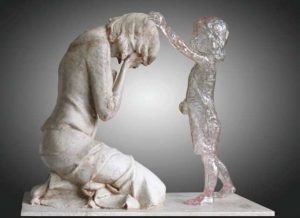
Mother’s Day is a wonderful time to celebrate mothers. But what about spiritual mothers?
In the world today, there is a huge need for spiritual mothers. Some people have the tendency to think that after their own children are out of the home, their role as a mother is minimized. But the church needs spiritual mothers.
The Apostle Paul had spiritual mothers, in Romans 16, he sends greetings to a list of people, and in verse 13 he says, “Greet Rufus, chosen in the Lord, and his mother, who has been a mother to me, too.”
Most mother’s days, the pastor tends to focus a message towards mothers in the church. But Mother’s Day is not a pleasant day for everyone. For those who long to be mothers and are not able to have children, Mother’s Day is extremely painful. For young women who want to be married and have children, it can also be painful and disconnected from where they are in life.
But today I want to change our focus. While not everyone is a mother – we all have mothers. We all are here today because someone carried us for nine months and gave birth to us. The Bible says that we are to honor our mothers (See Ephesians 6:1-3). Here Paul quotes the ten commandments, and he adds a little commentary by saying, this is the first commandment with a promise.
This passage from Ephesians 6, is in the middle of an extended portion where Paul is addressing all our human relationships. Wives and husbands, children and parents, slaves and masters, or our modern work relationships, and then he ends with section with an exhortation to put on the full armor of God, because our struggle is not against flesh and blood, but rather against all the spiritual forces of evil (Ephesians 6v12).
Why does he end this whole section with this seemingly disconnected challenge to spiritual warfare?
Because, Satan is constantly out to destroy relationships, to tear down the bond of families, to destroy our love and respect for each other. God ordained families to be the place where children are raised up to know and love Him, to learn the truth about love, respect, and the Gospel. Our families are under attack daily and we need to be aware of this. The best way for families to be strong, is to pray together, it is no small thing for families to pray together, and often it is the mother who must take the initiative and lead this.
What does it mean to “honor” your mother? If you’re a child, then it means to obey, to submit to her authority. And not just to do what she says, but to yield graciously, willingly and cheerfully. Simply doing what you are told, with a bad attitude it not honoring. True obedience flows from a heart attitude that freely accepts the mother’s rightful authority.
Parental authority is given by God, and so the attitude the child develops toward the parent’s authority will be the attitude they develop towards God’s authority. Parents, if you allow your children to ignore and despise your authority over them, then they will learn to ignore and despise God’s authority over them as well.
What about children who are out of the home? An adult child is no longer obligated to comply with the desires and wishes of their parent, you and I have a choice to listen, evaluate the request and to choose whether or not to comply with the request of our parent. Sometimes, parents can be quite overbearing and use this scripture verse to manipulate and control their adult child. but this is not what God intended with this commandment.
Honoring is not blind obedience, it is respect and courtesy, taking time to hear their opinion, treating our mothers with honor is as simple as giving them time.
Honoring your mother also includes how you speak to her, and about her. This applies both to young people and to adults. Pay attention to your tone of voice when you’re talking with your mother, is it kind, gentle, gracious? Or is it impatient, angry or bitter? Your tone of voice reflects your heart attitude.
Another thing we can do to honor our mothers is to praise them, to verbally acknowledge their virtues and accomplishments, to give thanks for all the things they do for us.
Husbands, acknowledge and praise your wives, this is a crucial way to develop an honoring culture in your home. Children will learn how to treat their mother by watching how you treat her, and if you are regularly praising and thanking her, then they will too.
Our mothers are a gift from God, the blessings that we receive from our mothers are from God (James 1:17). The good characteristics that we see in our mothers, the creativity, the strength, the wisdom, the love and so much more come from God. Let us remember as we honor mothers, to praise God for mothers.
But we can talk about honoring mothers, respecting them and obeying them, however as followers of Jesus Christ our ultimate loyalty must be Christ. Jesus is the one who paid for our sins by dying on the cross for us, Jesus was raised from the dead by God and Jesus is the one who paid for our eternal life. As well-meaning and wonderful as our mothers may be, as followers of Jesus Christ, our lives belong to him. As we seek to live our lives as followers of Jesus, ultimately, we answer to him as Lord of our lives (Matthew 10:37-39).
We are to love and honor our mothers, because there is blessing in that as the commandment says, but even more than that, we need to love and honor Christ. Are you doing that?
Mothers and fathers, are you pointing your children to the savior, are you encouraging them to love Christ even more than they love you?








